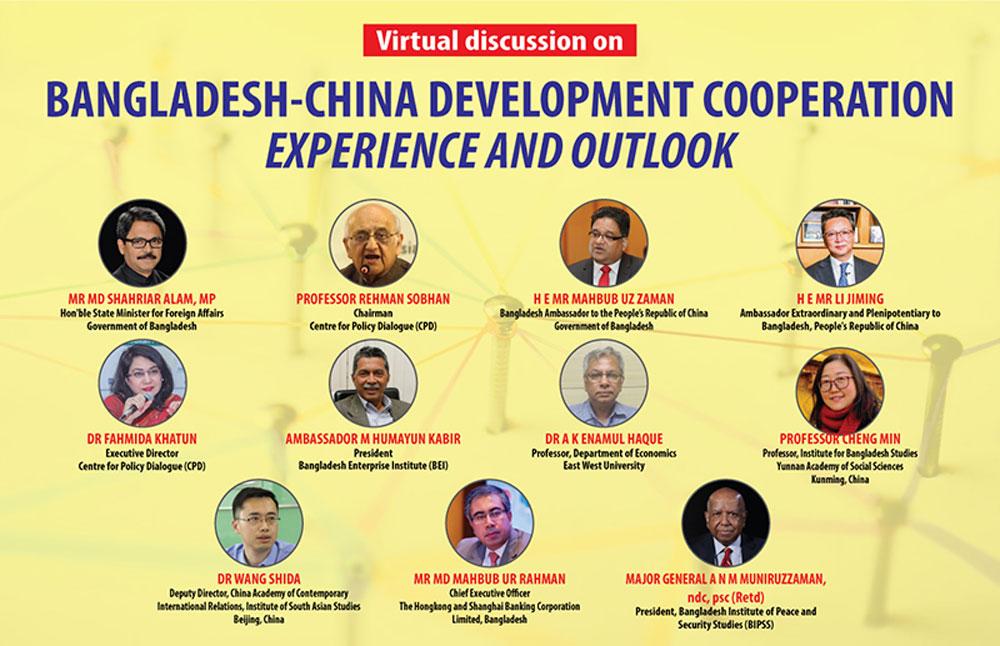
In recent years, both economic factors and proactive foreign policy have facilitated Sino-Bangladesh economic relations to grow manifold. This spans from trade and investment to education and health. There are wider future possibilities for both countries in terms of trade and investments according to experts. The year 2020 marks the 45th anniversary of Bangladesh-China diplomatic ties. Bangladesh and China are upholding a strong bilateral partnership which is strategically significant for both countries.
In this backdrop, a virtual discussion session titled “Bangladesh-China Development Cooperation: Experience and Outlook” was organised by the Centre for Policy Dialogue (CPD) on Thursday, 29 October 2020. The objective of the event was to review Bangladesh’s economic relationship with China and discuss the outlook for future bilateral partnership through investment and trade.
Dr Fahmida Khatun, Executive Director, CPD, in her introductory remarks and highlighted the current trade relationship and future trade prospects between Bangladesh and China and opined that more investment was required, especially in the social sectors.
Ambassador M Humayun Kabir, President, Bangladesh Enterprise Institute (BEI), said that Bangladesh is at the risk of losing independent decision-making process amid pressures from global powers and their engagements in the region.
Dr A K Enamul Haque, Professor, Department of Economics, East West University, emphasised on business-to-business (B2B) connectivity to bring investments from China. He mentioned that there should be government initiatives and private initiatives as well. He added that strategic goals should be wider than just government-to-government cooperation.
“Chinese loans are different from loans provided by other traditional lenders, and Bangladesh as a growing economy has offered the scope for investments for China”, said Professor Cheng Min, Professor, Institute for Bangladesh Studies, Yunnan Academy of Social Sciences, Kunming, China.
Dr Wang Shida, Deputy Director, China Academy of Contemporary International Relations, Institute of South Asian Studies, Beijing, China, mentioned about the security cooperation issues between Bangladesh and China that were presently on the negotiation table.
Bangladesh’s footprint in three major areas: domestic demand, infrastructure and supply chain reconfiguration, is up to the mark with China, according to Md Mahbub Ur Rahman, Chief Executive Officer, The Hongkong and Shanghai Banking Corporation Limited, Bangladesh.
Major General A N M Muniruzzaman, President, Bangladesh Institute of Peace and Security Studies (BIPSS), suggested that Bangladesh and China should think out of the box for cooperation and explore wider opportunities strategically.
H E Mr Mahbub Uz Zaman, Bangladesh Ambassador to the People’s Republic of China, Government of Bangladesh and H E Mr Li Jiming, Ambassador Extraordinary and Plenipotentiary to Bangladesh, People’s Republic of China, attended the discussion as Guests of Honour. H E Mr Li Jiming conveyed his remarks on more investment possibilities in the high-tech field, such as high-speed railway, aerospace, blue economy, artificial intelligence and 5G telecommunications.
“There is an increasing interest of investment and growth in exclusive economic zones and Bangladesh has a strong commitment on close economic cooperation with China”, said Mr Md Shahriar Alam, MP, Hon’ble State Minister for Foreign Affairs, Government of Bangladesh. He also elaborately discussed about the relationship between the Bangladeshi and Chinese authorities.
Professor Rehman Sobhan, Chairman, CPD opined that China has been thinking about a broader inclusive economic partnership with South Asia for a long time. He mentioned that in terms of exports, China is one of the largest trading partners of Bangladesh, and they had a vision for widening the relationship between both countries as part of their long-term strategic thinking.
The virtual dialogue was participated by an esteemed group of high-level policymakers, academics, experts, business leaders, civil society members, development partners and representatives of the media from Bangladesh, China, and beyond.


